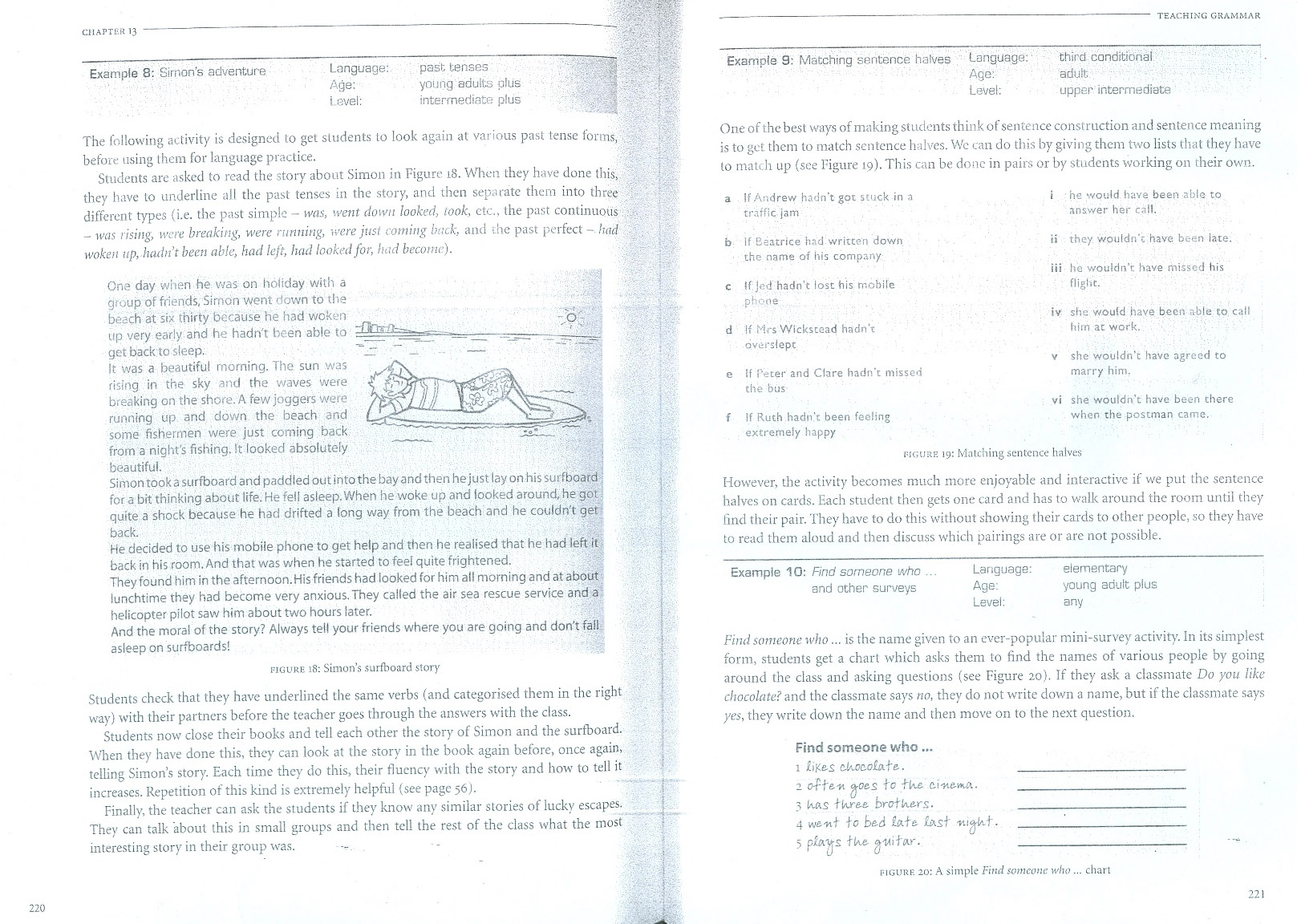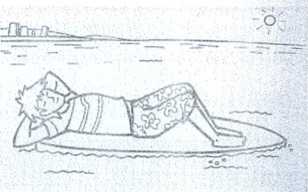0016


Example 8: Sirnon's adventure
Longuage: past tenses ;.
Age: young adulis plus
Level: intermediate plus
The following aclivity is designed lo get students lo look again at various past tense forms, before using them for language practice.
Students are asked to read the story about Simon in Figurę t8. When they have done this, they have to underline all the past tenses in the story, and then sępa ratę them into three different types {i.e. the past simplc - was, went down looked, took, etc., the past continuous - was rising, were breaking, were running, werejust comiitg bitek, and the past perfect - had woken up,hadn’tbeen able, had left, had looked for, had become).

Cne day when he was on holiday with a group of friends, Simon went down to the beach at sik thirty becau.se he had woken up very early and he hadnt been able to get back to sleep.
It was a beautifu! morning. The sun was rising in the sky and the waves were breaking on the shore. A few joggers were running up and down the beach and some fishermen were just coming backi from a night's fishing. !t looked absolutely beautiful.
Simon tooka surfboard and paddled out into the bay and then hejust lay on his sur fboard for a bit thinking about life. He fell asleep. When he woke up and looked around, he got quite a shock because he had drifted a long way from the beach and he couldn't get back.
He decided to use his mobile phone to get help and then he realised that he had left it back in his room. And that was when he started to feel quite frightened.
They found him in the afternoon.His friends had looked for him all morning and at about lunchtime they had become very anxious.They called the air sea rescue service and a heiicopter pilot saw him about two hours later.
And the morał of the story? Always tell your friends where you are going and don't fali asleep on surfboards!
figurę iS: Simon’s surfboard stor)'
Students check that they have underlined the same verbs (and categorised them in the right way) with their partners before the teacher goes through the answers with the class.
Students now close their books and tell each other the story of Simon and the surfboard. When they have done this, they can look at the story in the book again before, once again, telling Simon’s story. Each time they do this, their fluency with the story and how to tell it inereases. Repetition of this kind is extremely helpful (see page 56).
Finally, the teacher can ask the students if they know any similar stories of lucky escapes. They can talk about this in smali groups and then tell the rest of the class what the most interesting story in their group was.
Example 9: Matching sentence halves Language: third canditiona!
Acje: aduft
Level: upper intermediate
One of the best ways of making students think of sentence construction and sentence mcaning is to get them lo match sentence halves. We can do this by gmng them two lists that they have lo match up (see Figurę 19). This can be done in pairs or by students working on their own.
a If Ar.drew hadn’t got stuck in a i he woutd have been able to
traffić jam answer her cali-
b If Seatrice had writcen down ii they wouldrTc have been late.
the name of his company
iii he wou!dn’t have missed his
c If Jed hadn’t lost his mobile flight.
pho.oe
iv she woutd have becń able to cali
d If Mrs Wickstead hadn't him at work.
bviirslepc
v she wouldn‘t have agreed to
e If Peter and Clare hadn*t missed marry him.
the bus
vi she wouidirt have been there
f If Ruth hadnt been feeJing when the postman came.
extremely happy
figurę 19: Matching sentence halve$
However, che activity becomes much morę enjoyable and interactive if we put the sentence ha!ves on cards. Each student then gets one card and has to walk around the room until they find their pair. They have to do this without showing their cards to other people, so they have to read them aloud and then discuss which pairings are or are not possible.
Exampie 10: Fina someone who ... Lariguage: elementary
and other surveys Age: young adult plus
Level: any
Find someone who... is the name given to an ever-popular mini-survey activity. In its simplest form, students get a chart which aslcs them to find the names of various people by going around the class and asking ąuestions (see Figurę 20). If they ask a classmate Do you like chocolate? and the classmate says no, they do not write down a name, but if the classmate says yes, they write down the name and then move on to the next question.
Find someone who ...
1 liye-s cJAOC.ob.Fe-. _
2 offe-n ffoes ło łke c.i-nem.0.. _
3 kas rkree brołkers. _
4 we-nł łc bed błe bsł -nijkł. _
3 pćajfS łke g-Mihar. _
pigurf. 20: A simple Find someone who ... chart
221
Wyszukiwarka
Podobne podstrony:
CSG182 171 The Subjunctive Mood Past Tenses: The Imperfect and the Pluperfect Subjunctive •
CSG184 173 The Subjunctive Mood Past Tenses: The Imperfect and the Pluperfect Subjunctive In real an
Czasy Przeszłe - Past Tenses Czasy prześle dotyczą konkretnej, określonej przeszłości, w związku z c
CSG046 Unit 4The Preterit TenseRegular Verbs in the Preterit The preterit (el preterito) is one of s
CSG173 Unit 15The 8ubjunotive Mood Past Tenses:The Imperfect and the Pluperfect Snbjnnctive Before l
CSG174 163 The Subjunctive Mood Past Tenses: The Imperfect and the Pluperfect SubjunctiveThe Imperfe
CSG176 The Subjunctive Mood Past Tenses: The Imperfect and the Pluperfect Subjunctive 165 5. &
CSG178 167 The Subjunctive Mood Past Tenses: The Imperfect and the Pluperfect SubjunctiveOther Uses
CSG180 The Subjunctive Mood Past Tenses: The Imperfect and the Pluperfect
CSG182 171 The Subjunctive Mood Past Tenses: The Imperfect and the Pluperfect Subjunctive •
CSG184 173 The Subjunctive Mood Past Tenses: The Imperfect and the Pluperfect Subjunctive In real an
CIIAPTER 13 CIIAPTER 13 Example 8: Sirnon s aelventune
więcej podobnych podstron